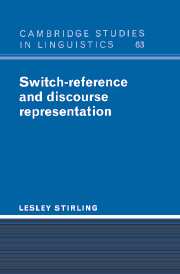Book contents
- Frontmatter
- Contents
- Preface
- List of abbreviations
- 1 Switch-reference phenomena
- 2 Functional extensions of switch-reference systems
- 3 Theoretical conceptions of switch-reference
- 4 Discourse Representation Theory and Unification Categorial Grammar
- 5 A Discourse Representation Theory account of switch-reference
- 6 Logophoricity
- Notes
- References
- Index
1 - Switch-reference phenomena
Published online by Cambridge University Press: 07 December 2009
- Frontmatter
- Contents
- Preface
- List of abbreviations
- 1 Switch-reference phenomena
- 2 Functional extensions of switch-reference systems
- 3 Theoretical conceptions of switch-reference
- 4 Discourse Representation Theory and Unification Categorial Grammar
- 5 A Discourse Representation Theory account of switch-reference
- 6 Logophoricity
- Notes
- References
- Index
Summary
Introduction
Switch-reference and logophoricity are both types of anaphoric linkage across clause boundaries which cannot be adequately accounted for by the Binding Theory (of Chomsky 1981 and later work). In central cases of switch-reference, a marker on the verb of one clause is used to indicate whether its subject has the same or different reference from the subject of an adjacent, syntactically related clause. In central cases of logophoricity, a special pronoun form is used within a reported speech context, to indicate co-reference with the source of the reported speech. This book gives a detailed examination of the two phenomena and proposes an account for them which is formalised in Discourse Representation Theory.
The major concern of the book is the functional complexity of switch-reference systems. Switch-reference markers have a much richer range of functions than just indicating obligatory co/disjoint reference. I will show that switch-reference systems are inextricably linked with the marking of temporal meaning as well as nominal meaning. I will then consider a range of apparently aberrant uses of switch-reference markers which have been reported for many languages. I will argue that unexpected uses of ‘same subject’ marking can be explained if we revise our definition of the switch-reference pivot and the switch-reference relation, in particular to take account of agentivity. The unexpected uses of ‘different subject’ marking which occur in fact represent common and systematic functional extensions of switch-reference systems which should be accounted for by any comprehensive theory.
- Type
- Chapter
- Information
- Switch-Reference and Discourse Representation , pp. 1 - 57Publisher: Cambridge University PressPrint publication year: 1993



